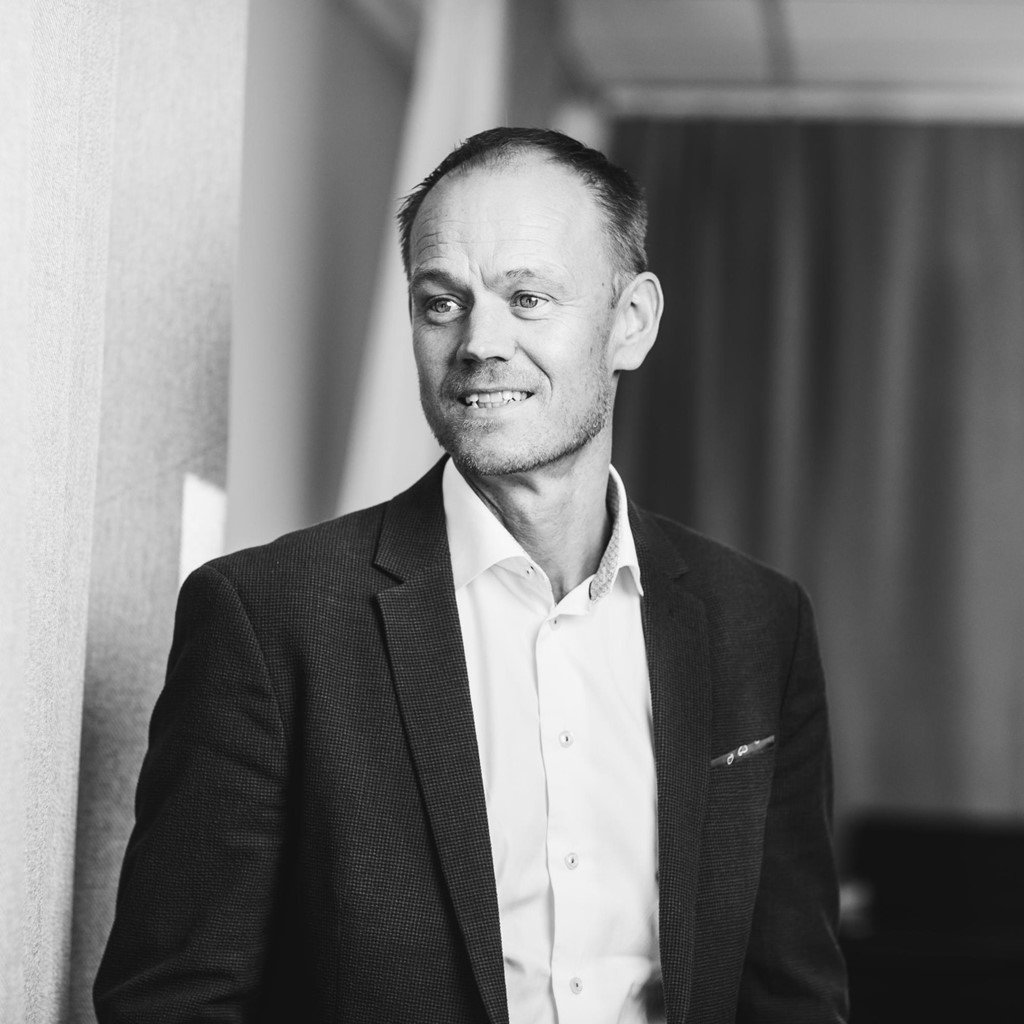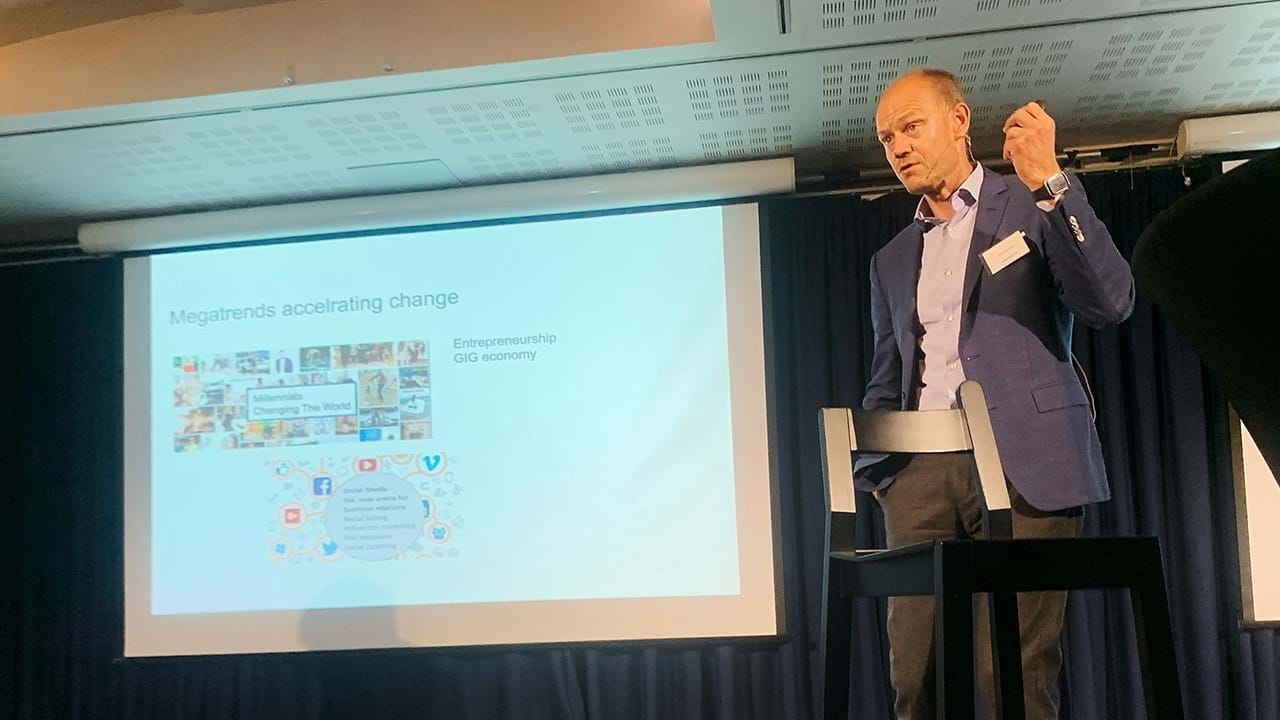Norvestor partner, Henning Vold, finds that the accelerating pace of change means that the current job market is practically temporary. In his presentation at Interimleder's 20th-anniversary seminar, he shared his thoughts on where this change stems from, as well as his experiences from developing entrepreneurial companies – and why interim management has particular relevance in these rapidly changing times.
– I want to start by contemplating a bit about what it is that is driving change in our society today – because I believe that it is the pace of change that makes the most significant difference and subsequently leads to a shift towards a more temporal workforce. Secondly, let's dive into how interim leaders – senior leaders in particular – are highly relevant in today, as well as the future, job market, Vold said as he took the stage.
Millennials create a drastic change in the general workforce
– We are used to describing major changes in the world as technology-driven – i.e., "from Morse code – to the world wide web", which is, of course, an indisputable premise. But right now, one of the most powerful changes the general workforce faces is millennials; the generation born between the early 80s and mid-90s, Vold points out.
Millennials in the western part of the world are significantly fewer than the generations of baby boomers and generation x that came before them, meaning that the battle for talent is already fierce, and Vold predicts that the competition will be even more intense moving forward.
He also points to the fact that millennials have never experienced a life without a smartphone and how that affects their preferences, attitudes, and expectations. As customers, but also in their work life.
– They are demanding, they are logged-on, and they expect an immediate response. They want to be heard, seen, and appreciated, and they have an outstanding platform that gives them just that; social media. A medium that for a little over a decade has made them accustomed to instant confirmation through the "like" button. That's why it's crucial to understand – even in terms of building businesses – how to make people feel heard, seen, and valued in a world that is changing much faster than we – the older generation – have been used to, Vold explains.
On the other hand, Vold also pays homage to how millennials are far more flexible in their attitude towards their job title. He believes this makes them far more responsive to accelerating change.
Entrepreneurship is on the rise
– What will sustain Norway after the oil and gas? Studies, which I have been involved in presenting myself, show that it is not the industrial locomotives that are driving employment growth. It's the entrepreneurs who start new businesses and potentially create a new export industry that can maintain the welfare state, Vold says.
This is beginning to sink in, and now you can even go to school to study entrepreneurship.
– In the past, there was very little interest in studying entrepreneurship, and the vast majority were motivated to get a permanent job with a fixed income. Now there is a tremendous entrepreneurial spirit among young people, starting new companies, which drives innovation, Vold states.
– This is the foundation of interim management
The entrepreneurial mentality focuses on "one customer at a time", working hard, and genuinely caring for each client. When the company grows, and middle managers are added to professionalize, customer attention is often watered down.
– An entrepreneurial team often dreams of expanding to other countries or have other growth ambitions. Our task here at Norvestor is then to look at how to develop a scale economy or more extensive reach towards the customers they already have and set up a structured plan to reach specific goals, Vold says.
And this is the sweet spot where Vold believes that interim leaders have a very relevant role.
– This is the foundation of interim management, and we have used interim managers ourselves in several situations like these, he adds.
According to Vold, much of the positive effect from interim management comes from developing people and training them by putting together confident teams with a safe space for entrepreneurial mentality while professionalizing and taking out scale benefits.
– As humans, if we become unsure and are made to step too far outside our comfort zone, we will simply shut don't and refuse change. This also happens in small-scale companies: "What will happen to my job? What tasks will I have now?". When these thoughts seep in, you start to fight change.
Therefore, the interim managers of the future must be relevant to the challenges companies are facing in terms of customer orientation, developing culture, and making employees feel secure. Otherwise, they will not go along with the change.
Confidence is key in High-performing teams
Vold points out how the mix between young people in their mid-twenties and the seniority and experience of an interim leader creates a particularly nice effect.
– It's a beneficial mix in both age and experience, and this creates high-performing teams. The interim leader's best attribute is that she establishes confidence in these processes and says, "Yes, you are going out of your comfort zone, and you will probably be a little scared, but I won't take you so far that you will be too scared." And "I've been involved in similar processes many times, so you can lean on me, Vold explains, adding:
– That is a huge resource, even in a digital economy and changing times, thanks to the confidence of the interim leader.
– Everything is interim
– The future is bright for interim management because everything is interim," Vold says.
– The rate of change is only increasing, which means that routines and systems or companies can't be constructed to last for an eternity – not even ten years. This is no longer viable. If you are lucky, you will be able to create a product or service that may be attractive in the market for 3-5 years. Development is the new constant, and that puts the old organizational structures under pressure.
The assumption is that it will be common with projects that have a start and end date, making it temporary.
– This development is something we have seen more and more of in recent years, and we believe that moving forward, this will accelerate.
Therefore, we should fear the large organization charts and complicated structures and instead build strong, customer-oriented teams. Next, we must measure and evaluate continuously; where did we make mistakes, and how can we improve?
– These are the types of strong cultures, and people will want to be a part of them because it means that they get to evolve constantly, Vold concludes.

– The rate of change is only increasing, which means that routines and systems or companies can't be constructed to last for an eternity – not even ten years. This is no longer viable. If you are lucky, you will be able to create a product or service that may be attractive in the market for 3-5 years. Development is the new constant, and that puts the old organizational structures under pressure.
Henning Vold,
Norvestor Partner
